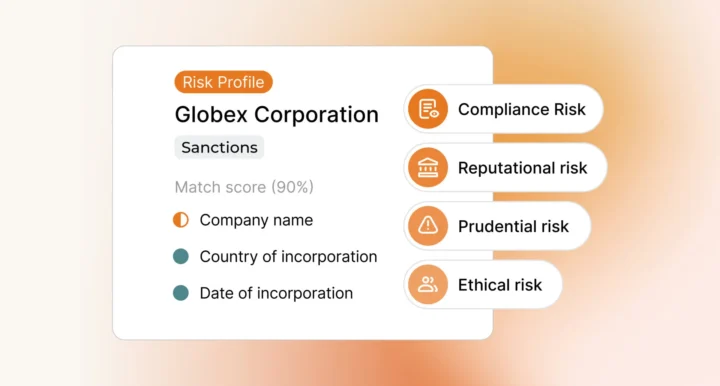While it’s easy to rely on tried and tested compliance strategies, the financial landscape moves fast, and firms must be able to keep pace with that change to prevent crimes like money laundering and to avoid damaging penalties. Achieving global regulatory compliance means having the right tools, resources, and knowledge in place to manage a range of threats, but even the smallest change in legislation or criminal methodology can have significant effects on a firm’s compliance performance. That challenge requires compliance officers to adjust their compliance approach constantly, screening customers regularly to capture changes in risk, and keeping up to date with the standards and best practices recommended by financial regulators.
In May 2022, the Wolfsberg Group, an association of global banks, published a series of negative news screening (NNS) FAQs to enhance international anti-money laundering (AML) and counter-financing of terrorism (CFT) standards. NNS, or adverse media, is a crucial component of AML/CFT strategies because changes in customer risk are often revealed by media sources before official confirmation. However, it’s easy to forget that established NNS strategies may quickly become outdated without regular reviews, consequently failing to account for new technologies or the sophistication of criminal methodologies.
With a focus on addressing the limitations of certain approaches to negative news screening, the Wolfsberg Group FAQs offer guidance on how firms should adjust their compliance solutions in a changing risk landscape. To help your organisation build and maintain a robust NNS solution, let’s take a look at some of the most important changes you might need to make to your framework in 2023, and the four things you should stop doing.
1. Stop screening against only sanctions and watchlists
Sanctions lists and watchlists, such as the UNSC sanctions list, set out the names of persons subject to international sanctions measures, which usually involve trade prohibitions, asset freezes, and other economic restrictions. Sanctions violations carry significant financial and criminal penalties, so it makes sense that firms focus heavily on screening those documents as part of the AML/CFT process. However, a variety of factors complicate the sanctions screening process, such as translation and spelling variations of names, and out-of-date information – both of which can lead to false positives and, worse, false negatives.
Given the importance of sanctions list compliance, the Wolfsberg Group FAQs recommend broadening the information collected to inform the process – specifically integrating NNS as a way to capture sanctions risk. Global adverse media screening represents a way to stay a step ahead of new sanctions designations, and to resolve potential screening discrepancies. For example, the identity of a customer with a name that resembles a sanctions designation, may be clarified with a NNS search that confirms any initial AML/CFT alert with peripheral information. Similarly, NNS enables firms to respond quickly to new data points, such as announcements of law enforcement investigations, before customers are added to the relevant sanctions lists.
2. Stop relying on search engines for NNS
Negative news media is so useful for AML/CFT compliance officers because it is available, for free, online and easily accessible through public search engines such as Google, Bing and Yahoo. These search engines can deliver results from across the world in seconds, and include data from news organisations, blogs, forums, social media pages, and more. Manual searches are easy to conduct, relatively low cost, and can be integrated easily into an existing compliance framework.
However, search engines have significant limitations in the context of AML/CFT compliance and using them exclusively to conduct NNS could expose your company to risk. Commercial search engines like Google are essentially just content-delivery mechanisms that deliver results based on algorithmic assumptions about what a user wants to find. Those algorithmic results are opposed to the exhaustive data contained in dedicated AML/CFT databases, which are updated regularly with highly relevant information.

3. Stop conducting NNS in a single language
Financial institutions may assume that because a transaction originates in a single country, it is acceptable to limit the NNS process to that country in order to capture criminal threats. This approach represents a dangerous blindspot since it ignores the scope of global financial crime, and the diverse range of risks that a firm may face. Global financial crime necessitates a global compliance response: in the context of NNS, this means that firms must go beyond the ‘immediate’ location of a suspicious transaction and expand the negative news screening process across borders, in more than one language.
Multi-language NNS more accurately reflects the shape and character of international financial crime, which might see a customer commit fraud in one jurisdiction and then try to launder the proceeds in another country. Similarly, a firm may need to screen against foreign language news sources in order to establish if a customer is (or will be) subject to sanctions – and is attempting to exploit a foreign financial system in order to evade those measures. This approach requires technology solutions with multi-language screening capability, conducted with the same level of efficiency as the firm’s native language. Multi-language screening should also take into account differences in spelling, transcription, and translation.
4. Stop overlooking ESG risk
Environmental, social, and governance (ESG) risk has become a global regulatory priority in recent years, with several governments releasing guidance and introducing plans for new laws based on the relevant ethical factors. While NNS has traditionally focused on financial regulations, ESG concerns include waste management, ecological practices, equity, fair labour practices, and community investment, amongst other issues. Failure to consider ESG risk can result in criminal, financial, and reputational damage, and the range of new screening considerations represent a significant compliance burden.
Fortunately, firms may also capture ESG risk data with existing NNS processes – in the same way as they might capture data on money laundering or similar crimes. NNS parameters may be adjusted to detect stories with specific ESG relevance, such as labour disputes, involvement in ecological disasters, and so on. With climate change, workplace equality, and other social concerns rising in prominence in 2023, firms that prepare their compliance frameworks for ESG regulation may be better placed to avoid regulatory friction.
Using Technology to Achieve Compliance in 2023
The Wolfsberg Group FAQ guidance may require service providers to make significant adjustments to their NNS process. That change can be a challenging prospect, involving the broadening of search parameters and the collection and analysis of vast amounts of media data from sources around the world.
In practice, effective NNS means integrating an agile and adaptable technology solution that reflects the fast-moving nature of the media landscape. It may seem burdensome to evolve an established NNS process to meet the standards set out in the Wolfsberg guidance, but it’s important to remember that modern compliance technology can help to reduce or even eliminate the risks associated with outdated NNS processes, with enhanced speed, efficiency, and accuracy.
Ripjar’s Labyrinth Screening platform was designed to address the demands of modern NNS compliance. Labyrinth enables firms to conduct real-time NNS, delivering actionable intelligence in seconds, and ensuring that you learn about changes in customer risk as soon as possible. Powered by cutting-edge machine learning technology, Labyrinth Screening offers a spectrum of compliance advantages, including search capabilities in over 20 foreign languages, and access to thousands of international data sources, from sanctions and watchlists to local and national news outlets.
To learn more about Ripjar’s NNS technology, click here
Last updated: 3 February 2025





